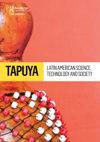Terrestrial politics and body-territory: two concepts to make sense of digital colonialism in Latin America
IF 1.2
Q2 HISTORY & PHILOSOPHY OF SCIENCE
Tapuya: Latin American Science, Technology and Society
Pub Date : 2022-09-20
DOI:10.1080/25729861.2022.2090485
引用次数: 1
Abstract
ABSTRACT Researchers have argued that data colonialism is paving the way for a new stage of capitalism, defined as the result of the appropriation and trade of “datafied” human experience (Couldry and Mejias 2019). While we agree that data colonialism normalizes the exploitation of human beings through data, we also contend that the analysis of the materiality of this exploitation should be extended to both bodies and territories. There is a research gap in the literature on territorializing the Internet and rendering its power asymmetries visible. In order to advance in filling this research gap, this article reviews two concepts to make sense of the digital colonialism in Latin America. On the one hand, we discuss Latour’s concept of “terrestrial politics” (2017, 2018; Latour and Weibel 2020. On the other hand, we examine the notion of “cuerpo-territorio” (body-territories) (Cabnal 2010; Colectivo Miradas Critiques 2017) and conduct a critical dialogue between terrestrial politics and body-territory. We argue that the notion of body-territories can contribute to Latour's proposal for a terrestrial politics by rendering visible the power relationships on the territories that sustain our digital society.陆地政治和身体领土:拉丁美洲数字殖民主义的两个概念
研究人员认为,数据殖民主义正在为资本主义的新阶段铺平道路,这被定义为“数据化”人类经验的挪用和交易的结果(Couldry and Mejias 2019)。虽然我们同意数据殖民主义通过数据使对人类的剥削正常化,但我们也认为,对这种剥削的实质性分析应扩展到机构和领土。关于互联网的属地化和权力不对称的显现,文献研究存在空白。为了填补这一研究空白,本文回顾了两个概念,以理解拉丁美洲的数字殖民主义。一方面,我们讨论了拉图尔的“陆地政治”概念(2017,2018;拉图尔和韦贝尔2020。另一方面,我们研究了“cuerpo-territorio”(身体领土)的概念(Cabnal 2010;集体Miradas批评2017),并在陆地政治和身体领土之间进行批判性对话。我们认为,身体领土的概念可以促进拉图尔关于地球政治的提议,因为它使维持我们数字社会的领土上的权力关系变得可见。
本文章由计算机程序翻译,如有差异,请以英文原文为准。
求助全文
约1分钟内获得全文
求助全文
来源期刊

Tapuya: Latin American Science, Technology and Society
Social Sciences-Social Sciences (all)
CiteScore
1.60
自引率
0.00%
发文量
39
审稿时长
19 weeks
 求助内容:
求助内容: 应助结果提醒方式:
应助结果提醒方式:


